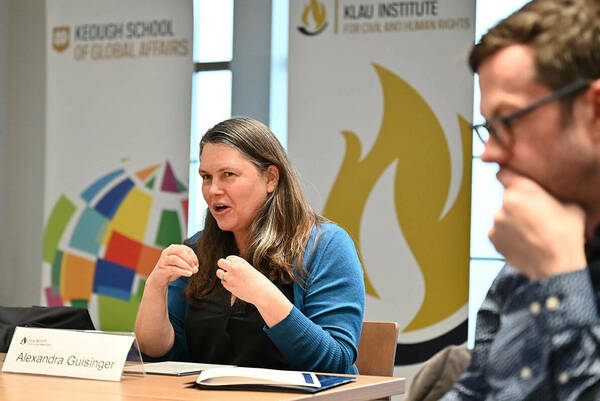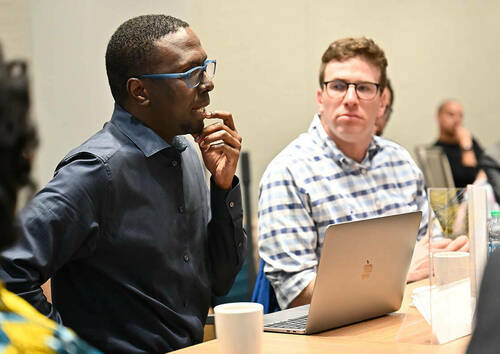
The intersection of race and international relations was the focus of an intensive workshop sponsored by the Klau Institute on March 31, 2023. The workshop was an initiative of Zoltan Buzas, associate professor of global affairs at the Keough School.
While race and racism have impacted international relations (IR) for more than a century – often, as Kelebogile Zvobogo points out, as a rationale for colonialism – it has received insufficient attention among scholars of IR. Existing work in the mainstream is often carried out in relative isolation, and the multiplicity of approaches promises a synergy that too often goes untapped. Buzas saw an opportunity to draw the various strands of the field into conversation.
“The community of IR scholars researching race and racism has been thinner than I would have liked,” Buzas noted. “The recent uptick in relevant work and the support of the Klau Institute provided an opportunity to come together to not only give each other useful feedback, but also try to strengthen that community. Like most things, research is better when done together.”
For a full day, 14 scholars of political science, IR, and related fields gathered at Notre Dame to discuss recent works in progress. Topics covered a wide range including racial tropes in foreign policy, international interventional, immigration, political economy, and more. During discussion, differing research methodologies and disciplinary biases became rich material for critique and learning.
“One of the exciting things about this workshop is that I can see a way forward, where people who have different perspectives can make positive contributions towards our understanding of international politics that go beyond familial disputes within the field, that sort of navel gazing.”
Austin Carson, associate professor of political science at the University of Chicago, found the diversity of perspectives enlightening. “I think that there's a tension I noticed,” said Carson. “Some people adopt a relatively universalist conception of what race means. And that might mean white or non-white or white/black binary, read globally. Then in other cases, I was excited to see people working on localized and contextual meanings of race, historically evolving meanings of race, on how we put race in the context of other concepts. I think there's something interesting there, and I feel like future work can go down those different paths.”
Owen Brown, a doctoral candidate at Northwestern University and one of the emerging scholars participating in the workshop, relished the freedom to engage honestly with these divergent approaches. “I appreciate that there wasn't a push, having these worlds collide, in a sense, no need to reconcile that or make it all sort of fit together,” he remarked. “I think leaving some of these tensions, leaving those be in sense, is fruitful. Engaging others’ work in a productive and helpful way that isn't combative.”
 Oumar Ba, assistant professor of government, Cornell University
Oumar Ba, assistant professor of government, Cornell UniversityCentral to Buzas’s vision for the workshop was to begin finding new opportunities for collaboration, allowing potentially isolated scholars to share, learn, and discover possibilities. Andrew Rosenberg, assistant professor of international relations and political methodology at the University of Florida, remarked on this opportunity. “One thing that IR is really notorious for is doing the "bringing blank in" paper, where “blank” is a whole list of things. And in a lot of situations, there's no advancement from that. It typically devolves into arguments about, oh, your way of bringing blank in isn't the right way, and it goes around in circles,” said Rosenberg. “One of the exciting things about this workshop is that I can see a way forward, where people who have different perspectives can make positive contributions towards our understanding of international politics that go beyond familial disputes within the field, that sort of navel gazing.”
Buzas was pleased with the workshop interaction and hopes for continued partnerships. “It was fantastic to be in the same room with so many talented, motivated, and nice people who share an interest in race and racism in international relations,” he said. “We will keep in touch, and I hope to organize a second workshop in the near future.”
Inspiring scholars working in the race/IR space to share and critique one another’s work is more than an end in itself. The hope is that by fostering a more tightly knit community, the scholarship – and, in time, policy informed by the scholarship – will be enriched. Emerging scholars in the field were of particular interest in this regard. Bianca Freeman, a doctoral candidate at the University of California San Diego, remarked in her closing remarks on this opportunity. “Several of us have written dissertations on race and IR on our own, in our own way,” she said. “And it's rare, I think, to get the opportunity to be in a room like this discussing race and IR. It's just very generative. I've truly been a student of each of you and your work here today and even before then. So I would love to see it continue.”